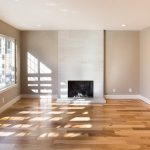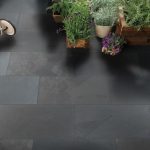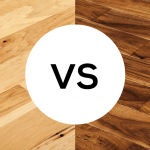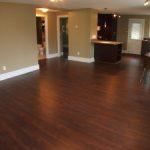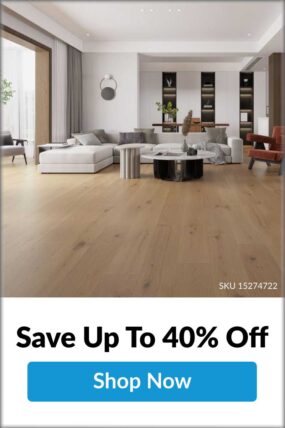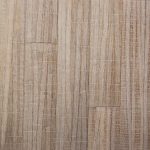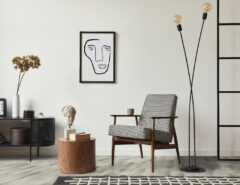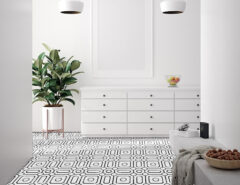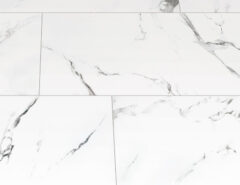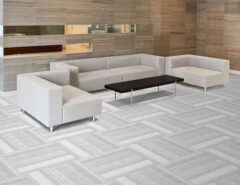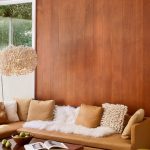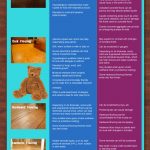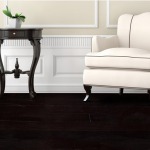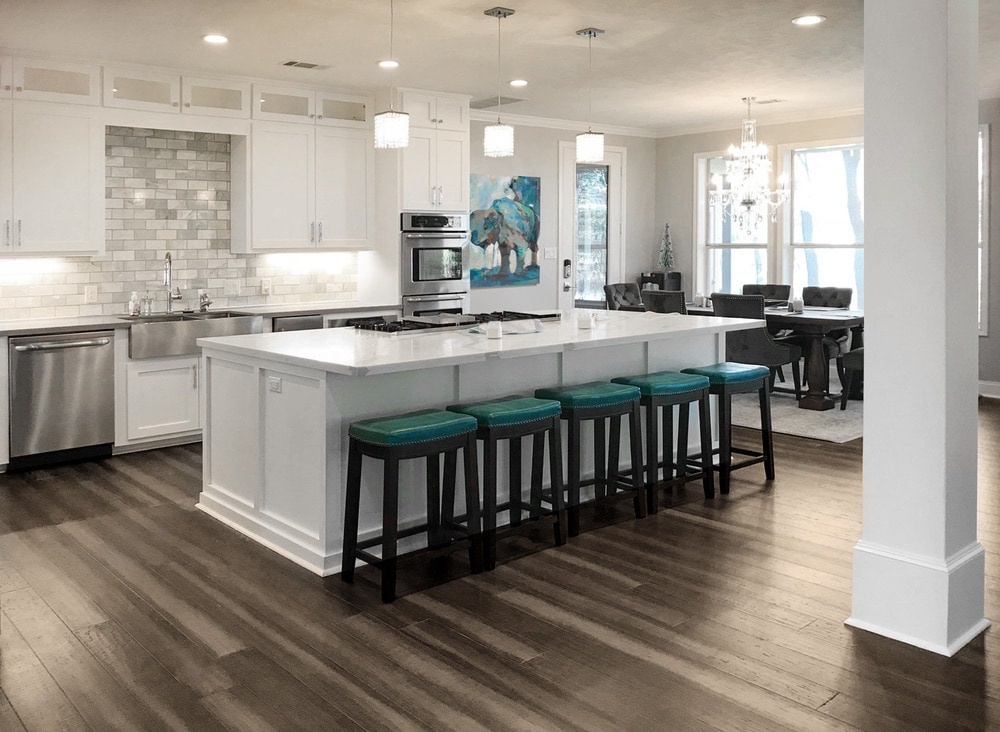
Engineered bamboo flooring is a durable, sustainable flooring option. It’s available in myriad colors and styles, and it’s appropriate for every room in your home, including the damp ones. Here, we look at engineered bamboo flooring, including how it’s made, its pros and cons, and some tips for installing it yourself.
How Engineered Bamboo Flooring is Made
Engineered bamboo flooring looks like it’s been sliced from solid lengths of bamboo, but there’s actually not much natural bamboo in the engineered planks. Engineered bamboo flooring consists of a backing layer made from cross-laminated plywood or fiberboard.
A very thin veneer of natural bamboo is glued to the backing layer. To get the veneer, stalks of bamboo are sliced into strips, and the skin is removed. The strips are boiled in boric acid, which removes the starch and kills any pests on the bamboo. The boiled bamboo strips are sent through a shredder and mixed into a thick pulp. As the bamboo pulp is mixed, individual strands become interwoven. A powerful adhesive is added to the pulp, and the mixture is placed into a mold, where pressure and heat forces the mixture into a dense, solid bar. When the adhesive dries, a thin veneer is sliced from the bar. The bamboo veneer is topped with a durable, transparent wear layer. In some cases, a waterproofing solution will be applied to the backs of the planks.
Engineered bamboo floors are very stable, and they’re a cinch to maintain. These floors are available in tongue-and-groove, click-and-lock planks that you can install yourself if you’re a practiced DIYer.
Pros of Engineered Bamboo Flooring

Engineered bamboo flooring is the easiest bamboo flooring type to install, and you can do it yourself. Although engineered bamboo planks aren’t waterproof, they’re more moisture-resistant than solid bamboo planks, thanks to the wear layer and the waterproofing on the bottoms of the planks. You can use engineered and in other rooms that see lots of moisture, like the laundry room, and bathroom. However, while they’re water-resistant, engineered bamboo floors are not waterproof, so you’ll want to wipe up spills quickly and avoid any standing water on the floors.
Engineered bamboo flooring that’s made with a cross-laminated wood substrate, in which layers of plywood are glued to one another with their grain directions alternating, is very durable and stable. It doesn’t typically expand and shrink with seasonal changes in climate and therefore won’t warp. Individual bamboo planks aren’t difficult to replace if they become damaged.
Bamboo is a type of grass that grows very quickly, which means that bamboo flooring is more sustainable than hardwood flooring, which requires felling trees that are decades old. Bamboo is harvested after three to seven years, making it an excellent renewable resource for flooring. Engineered bamboo flooring is certified as a respiratory-friendly option for people who suffer from allergies, asthma, or another respiratory illness.
Engineered bamboo flooring is available in a wide range of colors, styles, and textures. This brindle engineered bamboo floor features a rich brown hue with honey-colored grains. For something lighter, this blonde engineered bamboo floor brightens your room and offers a more contemporary look. And for something a little different, you can find non-traditional colors like this charcoal engineered bamboo floor.
Engineered
The price of engineered bamboo floors are roughly comparable to the cost of solid bamboo flooring. Depending on the quality of the wear layer and the thickness of the veneer, engineered bamboo wood floors can cost anywhere from $3 to $5 per square foot. If you hire someone else to install your floor, the installed price will be higher.
Cons of Engineered Bamboo Flooring
Engineered bamboo flooring is beautiful and durable, but it has some downsides, too. Perhaps the most important is that engineered bamboo floors can’t be refinished. Once the wear layer degrades, which it will do over time, the floor will need to be replaced. This is due to the thin profile of the bamboo veneer, which isn’t thick enough to sand.
Since engineered bamboo is manufactured as a floating floor, it won’t feel as solid underfoot as a solid bamboo floor. Engineered bamboo flooring is less regulated than other wood flooring types, so its manufacture may involve more toxic chemicals than other flooring types. Look for certifications to ensure your engineered bamboo floors are responsibly manufactured with as few chemicals and as little environmental damage as possible.
DIY Installation Tips
Engineered bamboo flooring is fairly easy to install, even for amateurs. It’s usually installed as a floating floor, which means that the floor isn’t nailed or glued down to the sub-floor. Rather, a foam or membrane underlayment is installed over the existing floor, and the engineered bamboo planks are laid over the top, locking together easily and firmly to produce tight seams. Here are some tips for installing a floating bamboo floor.
- Make sure the subfloor is clean, dry, and level before you install your bamboo floor.
- Let the boxes of engineered bamboo planks sit in your home for a few days before you install to ensure it acclimates to the humidity level in your home.
- When you’re ready to install the floor, sort the planks into piles of light, medium, and dark colors. The variation between these won’t be significant, but you’ll want to stagger the colors and patterns throughout the room to ensure the most natural look.
- Choose a high quality membrane for the base of your installation. The membrane will serve as a vapor barrier and keep moisture and mold problems at bay.
Choosing an engineered bamboo floor is a great way to get the look and feel of hardwood without the expense, environmental impact, and other downsides associated with oak, maple, and other hardwoods. Engineered bamboo floors last up to 25 years under normal-to-heavy wear and tear, and they’ll transform your rooms with their unique beauty.


